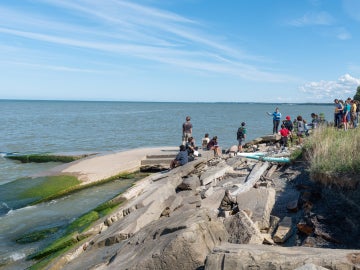Pre-Med Student Gets on the Road Training
Anna Slebonick ’22 Gains Valuable Experience as a Pre-Med Student and EMT
November 3, 2021
Yvonne Gay

Anna Slebonick ’22
Photo credit: Tanya Rosen-Jones '97
Anna Slebonick spent most of the summer forging quick relationships with patients while the emergency unit she worked in raced down the road.
Slebonick, a fourth-year biology major and chemistry and economics minor, is in Oberlin College’s Pre-Medicine and Health Careers Program. Although her work as an emergency medical technician (EMT) is not a requirement, the direct patient care she experiences has proven to be a valuable asset.
“The most meaningful part of my job is forming a rapport with patients,” says Slebonick, who began her work as a volunteer EMT in 2020 before becoming a full-time employee this past summer.
“In emergency medicine, you have very little information about the patient prior to arrival. It is important to quickly form a meaningful relationship in order to learn about the patient’s condition and medical history. I learned how to show empathy while asking the right questions, which helped me successfully care for and treat patients. Establishing trust is an essential skill as a healthcare provider.”
Emergency medical situations are something to which Slebonick has had a lot of exposure.
While growing up in Pittsburgh, Pennsylvania, her brother had severe milk and nut allergies, which meant her family had to be very conscious of not only what they ate, but how food was prepared and what they touched after eating. The experience put a lot of stress and pressure on her parents.
“As I got older, I realized how much of an impact my brother’s allergies had on our family,” she says. “Once it came time to think about college and possible careers, helping those who go through the same struggles that my brother and my family did felt very fitting.”
During her course of study at Oberlin, Slebonick’s interest in medicine deepened as she explored the sciences through research.
In the fall 2020 Junior Practicum Program, she was mentored by Associate Professor of Religion Joyce Babyak on a project that investigated technology, ethics, and privacy related to genetic testing—a topic of her choosing.

After reviewing scholarly articles, recommendations written by medical organizations, and privacy policies of direct-to-consumer genetic testing companies, “I learned that clinical pediatric genetic testing raises less ethical and privacy concerns than direct-to-consumer genetic testing on children,” she explains. “The final product was a research paper that argues clinical pediatric genetic testing upholds more validity than direct-to-consumer genetic testing on children.”
Slebonick’s recent research paper with Babyak explores the ethical issues with preimplantation genetic diagnosis and cross-border reproductive care. The paper “argues that using preimplantation genetic diagnosis and participating in cross-border reproductive care for nonmedical purposes contributes to the commodification of reproduction.”
Slebonick maintains a busy schedule this academic year—while in Oberlin’s pre-med program she continues to be on-call as an EMT and is a member of Oberlin’s softball team but—she says, it can all be managed with a healthy respect for time management.
“My best advice [to students interested in pre-med] is to face uncomfortable situations. It might feel intimidating starting new academic research or clinical experiences, but once you face the initial discomfort, you can learn so much about yourself and your interests. Entering new experiences is almost certain to open new opportunities to grow both professionally and personally.”
After graduating from Oberlin in the spring, Slebonick plans to take a gap year before entering medical school, where she will prepare for a career as an allergist. During her break, she plans to work either in research or as an EMT.
“Right now, continuity of care interests me the most. As EMTs, we only see patients for a brief period of time. I found myself wondering what happened to my patients after we brought them to the emergency room. I’m excited for my career to have that continuity of care aspect and form longer-lasting relationships with my patients.”
You may also like…
Banking on Sustainability
Former Oberlin basketball star Christian Fioretti ’20 applies his lifelong concern for the environment to a career in sustainability.
Research Roundup
Every day, Oberlin’s faculty and students produce scholarly work that uncovers new insights into how we understand the world, particularly in the areas of sustainability and the environment.
Oberlin Adds Sport Studies and Management Integrative Concentration
Sport is many things: a vehicle for personal inspiration and identity formation, a catalyst for social change, an economic driver, and a contributor to health and well-being. Given all this, sport is...


